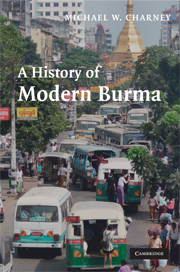Book contents
- Frontmatter
- Contents
- List of figures
- List of maps
- Chronology
- Abbreviations
- Introduction
- Chapter 1 Burma under colonial rule
- Chapter 2 The colonial center
- chapter 3 Self-government without independence, 1937–1947
- Chapter 4 The democratic experiment, 1948–1958
- Chapter 5 Dress rehearsals, 1958–1962
- Chapter 6 The Revolutionary Council
- Chapter 7 The BSPP years
- Chapter 8 Toward democracy, 1988–1990
- Chapter 9 Perpetual delay, 1990 to the present
- Conclusion
- Notes
- Readings
- Index
Chapter 4 - The democratic experiment, 1948–1958
Published online by Cambridge University Press: 05 February 2015
- Frontmatter
- Contents
- List of figures
- List of maps
- Chronology
- Abbreviations
- Introduction
- Chapter 1 Burma under colonial rule
- Chapter 2 The colonial center
- chapter 3 Self-government without independence, 1937–1947
- Chapter 4 The democratic experiment, 1948–1958
- Chapter 5 Dress rehearsals, 1958–1962
- Chapter 6 The Revolutionary Council
- Chapter 7 The BSPP years
- Chapter 8 Toward democracy, 1988–1990
- Chapter 9 Perpetual delay, 1990 to the present
- Conclusion
- Notes
- Readings
- Index
Summary
Aung San’s assassination in 1947 cast a long shadow over independent Burma. Nu was handed the task of leading Burma in an experiment with democracy that ended badly. This was partly due to the fact that Nu lacked much of the single-minded focus, political skills, and organizational ability of his predecessor. Perhaps more blame could be directed at the myriad political, ethnic, and institutional forces set loose. It could be said that by comparison to the 1945–1947 period, when the Burmese had unity, but not independence, that under Nu, Burma had independence, but not unity. The Burmese had achieved independence without a revolution, which prevented the emergence of internal solidarity or the squeezing out of rival groups and ideologies that occurred, for example, with the Vietminh in the face of French military efforts to reestablish their control in the First Indochina War. Whereas the Vietminh were provided with the opportunity to cultivate the political solidarity originally developed to oppose the Japanese and Vichy French, after World War II, in Burma the old political rivalries reemerged very quickly, especially as the British left.
To make matters worse, guns and other weaponry were everywhere, whether abandoned by the British in 1942 or by the Japanese in 1945, or supplied to the men of the BIA. Around the country were PVO soldiers, consisting mainly of men demobilized from the BIA and then remobilized but kept in a virtual limbo to give Aung San potential muscle in his negotiations with the British. With Aung San gone, the PVOs were directionless, although mostly left-leaning, and looking for a cause. Communists, rightists, Karens, Mons, and a number of other groups, several of whom had begun revolt under the British and now determined to continue against the Nu regime, thus had the means available to make war on the young government.
- Type
- Chapter
- Information
- A History of Modern Burma , pp. 72 - 92Publisher: Cambridge University PressPrint publication year: 2009



